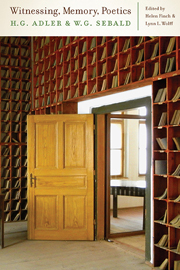Book contents
- Frontmatter
- Contents
- Acknowledgments
- List of Abbreviations
- Introduction: The Adler-Sebald Intertextual Relationship as Paradigm for Intergenerational Literary Testimony
- Part I Intertexts in Context
- Part II Witnessing Trauma and the Poetics of Witnessing
- Part III Memory, Memorialization and the Re-Presentation of History
- Part IV Literary Legacies and Networks
- Afterword
- Bibliography
- Notes on the Contributors
- Index
Afterword
Published online by Cambridge University Press: 05 October 2014
- Frontmatter
- Contents
- Acknowledgments
- List of Abbreviations
- Introduction: The Adler-Sebald Intertextual Relationship as Paradigm for Intergenerational Literary Testimony
- Part I Intertexts in Context
- Part II Witnessing Trauma and the Poetics of Witnessing
- Part III Memory, Memorialization and the Re-Presentation of History
- Part IV Literary Legacies and Networks
- Afterword
- Bibliography
- Notes on the Contributors
- Index
Summary
At first, one is alarmed to hear H. G. Adler and W. G. Sebald's names uttered in the same breath. Why these two in particular, and not two or three others? However, if one ponders this a few moments longer—and coincidentally happened to know both of them as I did—suddenly a network of connections arises, the entanglement of which only allows for the following conclusion: yes, these two solitary men, who likely never met one another personally, belong together.
When Winfried Georg Sebald was born in Wertach im Allgäu in 1944 at the end of the hopeless war, the Nazis deported Hans Günther Adler to Auschwitz, the second stage of his governmentally decreed humiliation, through a land whose language he loved and in which he wrote his works. The horror of Theresienstadt already lay behind him. It always remained a mystery to me how H. G. Adler, the survivor, managed to raise the strength and will to record the system of degradation which he had to experience on his own body. I imagine how he would sit in front of his typewriter in London and write—page by page, as uninvolved as possible and at the same time involved like no other—the record and the analytical penetration of the camp in which he was supposed to perish. Why did he put himself through this—to return to that prison, guided by the “muse of remembrance” which does not want to differentiate between good and evil? Why would the other survivors, those who had built this camp and who obviously had never anticipated ever being held accountable or punished, why would they not write of their crimes themselves? Why aren’t there thousands of precise descriptions of the brutality of all those executioners who, for the most part, even had time as pensioners in West Germany to come to terms with their past?
- Type
- Chapter
- Information
- Witnessing, Memory, PoeticsH. G. Adler and W. G. Sebald, pp. 275 - 276Publisher: Boydell & BrewerPrint publication year: 2014

